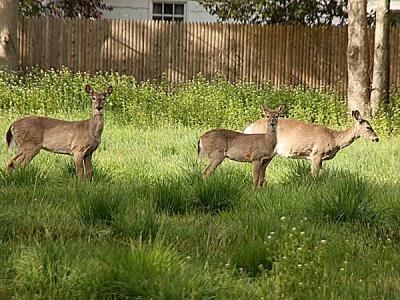Ruminant Rumblings

At a town board session on Tuesday, the East Hampton Group for Wildlife offered to raise money and help the town secure grants to pay for a deer contraception program similar to one that, members said, has achieved a 79-percent reduction in the fawning rate among deer on Fire Island.
Bill Crain of Montauk, the president of the group, and his wife, Ellen Crain, outlined a proposal for a pilot study through which 30 does would be vaccinated with a contraceptive made with a protein from purified pig ovaries, effective for three to four years, and 10 given a placebo. The does would be tagged so they could be monitored for four years to see if they give birth to fawns.
Ms. Crain, a professor of pediatric and emergency medicine at the Albert Einstein College of Medicine, said research shows that hunting does not adequately control deer populations, and nationwide studies show that most Americans oppose hunting.
She said she and Mr. Crain had found, in informal polling of people here, outside the post office, for instance, that a local majority is against hunting but most feel that something has to be done to control the number of deer.
In introducing his wife to the East Hampton Town Board, Mr. Crain pointed out that she has been awarded $4 million in grants from the National Institutes of Health and won an Environmental Protection Agency award for establishing the nation’s first program in environmental pediatrics.
The contraceptive vaccine that could be used on the deer has proved to be safe and “not harmful to humans or to animals that eat deer,” Ms. Crain said, and it is used by the United States government to control herds of wild horses in the West. It would be provided for free by its developer, a veterinarian who would also offer his services to oversee an East Hampton pilot study. Dr. Jonathan Turetsky, an East Hampton vet, has offered to oversee care of the deer, Ms. Crain said. The program would have no cost to the town.
Because a vaccination program is “stressful” to deer, Ms. Crain said, the group would “expect to have no expansion of hunting during the study period.”
The best time of year to begin a vaccination program is the late fall, she said. The town would need to obtain approval from the State Department of Environmental Conservation — which, Ms. Crain warned, has not generally supported deer contraception programs.
Whatever steps the board decides to take, she cautioned, should be based on solid data.
The wildlife group also suggested several “no-cost activities” that the town could implement immediately to address conflicts between deer and humans here.
A campaign for slower driving could reduce the number of accidents and injuries resulting from collisions with deer on the roads, Ms. Crain said. An East Hampton Group for Wildlife project, whereby reflectors designed to deter deer from crossing the road, has been installed along some stretches, has “dramatically reduced” accidents in those areas and will be expanded thanks to the town board’s permission, she said.
Ms. Crain also suggested that the town designate some of its nature preserves as sanctuaries where deer would not be hunted. “Deer are not dumb,” she said, suggesting that they would find their way to and remain in areas where they are safe. “This might help to keep the deer off the road and out of people’s landscaping,” she said.
Councilman Dominick Stanzione has been working to address deer-related issues, including the proliferation of deer fencing throughout the town, and has met recently with the East Hampton Group for Wildlife to develop a comprehensive approach. He thanked the Crains for their presentation. “I applaud you for making these recommendations,” he said.
